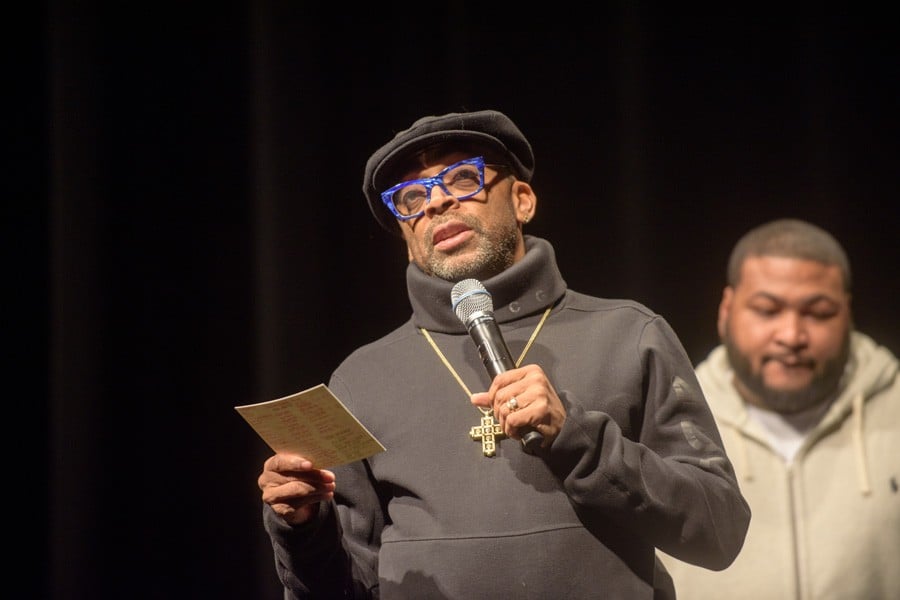Spike Lee stirs opinions, emotions at ‘Chi-Raq’ screening and discussion
Director Spike Lee discusses his latest film, “Chi-Raq,” at Cahn Auditorium. Lee’s talk sparked polarized responses from the audience.
March 3, 2016
A discussion with film director Spike Lee sparked conversation about the satire in his latest film, “Chi-Raq,” and incited controversy among the sold-out crowd in Cahn Auditorium on Wednesday night.
The event, hosted by the Contemporary Thought Speaker Series, the Weinberg College of Arts and Sciences and the Department of Political Science, began with a screening of the movie, a modern-day adaptation of the ancient Greek play “Lysistrata” that satirizes and illustrates gun violence in Chicago. A talk with Lee and two former Chicago gang members who played minor roles followed. Lee, a two-time Oscar Award nominee who has gained fame as a producer and director of politically charged films, spoke to the audience of nearly 1,000 about the issues in South and West Side Chicago neighborhoods that were portrayed in the movie.
But during the following Q&A, several audience members criticized the film for belittling and oversexualizing women, mocking the serious topic with frequent humor and portraying Chicago in an overly negative light.
“Chi-Raq” features Nick Cannon as a misguided gang leader and Teyonah Parris as the leader of a sex strike, in which she recruits the entire female population to practice abstinence until inter-gang violence ends.
Lee said he decided to make the movie to bring attention to gun violence in the city, which has cost more lives than the wars in Iraq and Afghanistan combined during the same time frame — inspiring the name for the movie. Calling Chicago “ground zero” for gun violence, Lee said 330 people were wounded or shot and 65 were murdered in Chicago during the 39-day span in which the movie was filmed last summer.
Lee also described instances of criticism from influential figures. During a meeting with Chicago Mayor Rahm Emanuel, the mayor critiqued the movie’s title for portraying a negative image of the city, and Chance the Rapper publicly criticized the movie when it was released in December. Lee responded by calling him a “fraud” due to his father’s involvement in the Emanuel administration and his silence on the controversy surrounding the mayor.
“You can blast the film, but you can’t say anything about the mayor’s policies?” Lee said. “It’s a punk-ass move.”
Curtis Toler and Brandon Jackson, the two former gang members who appeared in the movie and have experienced gang violence, talked about their newfound commitment to bettering Chicago neighborhoods with high crime rates.
“I was a part of the problem; now I’m part of the solution,” Jackson said. “Killing our own ain’t gangster. Raising our own and taking them through school is gangster.”
During the Q&A, the crowd’s focus quickly shifted back to Lee, however, whose opinions divided the audience. The majority of the crowd gave loud applause for his proclamations about the divide between the prosperous and poor regions of Chicago and his right as a filmmaker to portray that how he wished.
Lee responded critically to comments, saying that much of the movie’s criticism is “bulls—” and, on one occasion, asking an audience member if she “wanted her money back” for watching the movie.
Annette Nance-Holt, who attended the screening as one of the Chicago mothers with murdered children who were consulted by Lee prior to the movie’s scripting, said she was disappointed by the Northwestern student body’s reaction.
“I thought younger people would be a little bit more open to a movie like that,” Nance-Holt said. “To get it to a diverse audience so they can see some of the issues that are in the community (is important) because the movie addresses different issues — a young lady with no parents, a young man with no father, … two gangs, how we don’t have education in the community and gun violence.”
Despite the critical comments, Ben Zimmermann, co-chair of CTSS, said the screening and discussion accomplished the goal of shedding new light on several crucial modern-day issues.
“This school year, (what) people have talked about the most is this issue of race relations,” the Weinberg sophomore said. “That issue coupled with gun violence … is so prevalent today, and the movie addresses all of these issues. His talk with the audience, while it did get a little heated, started a really interesting conversation.”
Email: [email protected]
Twitter: @benpope111


